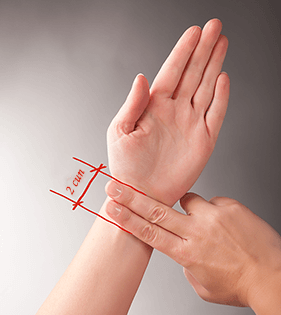Morning sickness occurs in more than half of all pregnancies.
This name that is given to describe the associated nausea and vomiting is itself misleading, as these symptoms usually last all day. The severity of morning sickness varies from one person to another, ranging from nausea alone to repeated vomiting several times a day. In some cases, women will find it virtually impossible to work or live a relatively normal existence. However, treating morning sickness with acupuncture can offer a safe remedy.
The specific physiological causes of morning sickness are unknown. Current medical thought generally believes it results from hormonal changes, possibly affecting the part of the brain that controls nausea and vomiting or else causing changes in the muscle contraction and relaxation patterns of the stomach and digestive system.
Whilst the exact causes remain unclear, evidence does show that certain women are more likely to experience morning sickness. These include migraine or motion sickness sufferers or women who have suffered nausea whilst taking birth control pills, those expecting a multiple pregnancy, or any mother who has suffered from it in a previous pregnancy.

The style of acupuncture associated with traditional Chinese medicine can be a very effective treatment for this condition. Perhaps this results from the very clear perspective that these practitioners have over the causes. Whilst the bio-physiological mechanics remain unclear, from this traditional perspective, there is an explanation. A very deep channel in the body called the Chong Mai is understood to supply blood to the uterus in women. With the absence of menstruation during pregnancy, the energy in this channel gets disrupted and interferes with the energy of the stomach. Therefore, energy (or Qi to be more precise) rebels upwards, causing the dual symptoms of nausea and vomiting.

Mark is one of many acupuncturists who has treated morning sickness with acupuncture. The patient normally responds very well. For treating morning sickness with acupuncture, he uses only a minimal amount of needles, normally no more than five.
One of these acupuncture points is located on the inner side of the forearm two thumb-widths proximal to the wrist and in-between the two prominent tendons. This point is called Nei Guan (which translates as Inner Pass in English) and is probably the most common point in treating morning sickness. This point is also commonly-used in many other conditions where energy from the stomach is disrupted and flows upwards, such as travel sickness, hiccups, or even bad breath. Gentle massaging of this point may be useful but is not as effective as acupuncture.
Whilst the symptoms may result from a weakened constitution, most of the time, they occur in healthy women with otherwise uncomplicated pregnancies. The only major concern is if the woman becomes dehydrated through vomiting and inability to keep down fluids. If she is unable to keep fluids down for any period longer than 24 hours, if she vomits more than she consumes, if there is a smell like acetone on the breath, or if there is a pronounced lack of urination, medical attention must be sought. This will normally entail a simple urine test and administration of a drip. Very severe cases of morning sickness are referred to as Hyperemesis Gravidarum and require hospitalisation. In fact, morning sickness is seen in traditional Chinese medicine as a positive thing. A strong, healthy foetus is more likely to cause disruption to the flow of energy in the mother’s centre. To back this up, western medical evidence suggests that women who suffer mild nausea and vomiting in the early stages of their pregnancy are less likely to miscarry. Some experts even believe that the process might have provided an evolutionary advantage for early humans.
There are a whole range of self-help remedies available for women. Their effectiveness will vary from one to another, and the important thing is that women chose what works for them. Eating smaller, more frequent meals is better than eating large meals. Leaving a couple of dry biscuits next to the bed to eat before getting up may help, and large fluid consumption with meals should be avoided with the bulk of fluid-intake to be taken between food. Mark also recommends trying to eat simple, easily digestible foods. Obviously any smells or tastes that trigger an attack of nausea should be avoided. Over-the-counter pharmaceutical medicines are available but should never be taken without prior consultation of a GP or healthcare professional.
There is no rational need to come for treatment before the onset of symptoms. Due to how well it responds to acupuncture, if the woman comes as soon as she begins to suffer morning sickness, it should be quickly controlled. However, because the cause of the imbalance is still there – the happy little foetus causing energetic mayhem in mum’s belly – weekly treatment is usually required for the rest of the first trimester. After this, the expectant mother should be fine to stop treatments.





